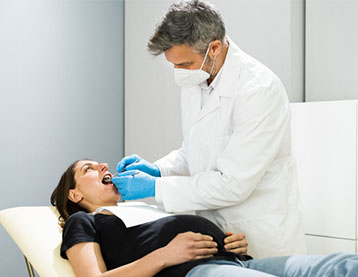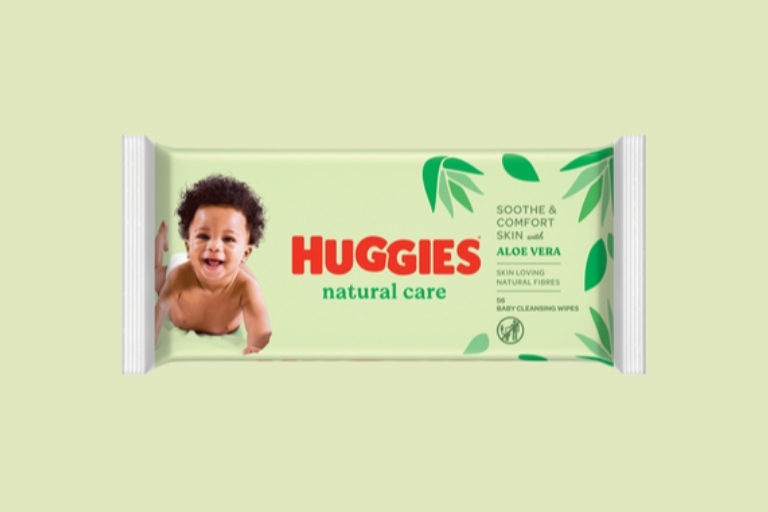Is it safe to go to the dentist while pregnant?

Why is dental health in pregnancy important?
When pregnant, your dental health is more important than ever—for both you and your baby. And best of all, you’re entitled to free dental care during pregnancy!
Did you know that you run a greater risk of experiencing dental problems in pregnancy? This is because of your changing hormones, a difference in eating patterns and morning sickness that exposes your teeth to more acid.
Your gums are also more vulnerable to the formation of plaque during pregnancy. This can lead to bleeding gums, gum disease, and tooth loss. It’s vital to make sure your teeth and gums are kept clean and healthy throughout your pregnancy to avoid these things.
How can I keep my teeth healthy throughout pregnancy?
There’s plenty you can do at home to keep your teeth, gums and mouth healthy—both during pregnancy and not. These include:
- Brushing your teeth for two minutes twice a day with fluoride toothpaste to remove plaque.
- Think about getting an electric toothbrush.
- Use interdental brushes or floss each day to get rid of plaque and trapped food.
- Check which mouthwashes are safe to use in pregnancy.
- Drink plenty of water to keep hydrated.
- Stay away from fizzy and acidic drink including juices.
- Keep hydrated with plenty of water.
- Try not to snack between meals.
- Eat foods rich in calcium such as cheese, milk, yoghurt, tofu, soya beans, nuts and green leafy vegetables. This will also help your baby’s teeth develop.
The NHS website also has lots of helpful information about caring for your teeth while pregnant.
Can you go to the dentist when pregnant?
The short answer is yes. For some treatments, going to the dentist is perfectly safe—others should be avoided. Ensure that your oral hygiene is scrupulous during these important few months to avoid any unnecessary trips.
A simple check-up is fine. Other safe treatments that your dentist can offer include cleaning and scaling your teeth to remove tartar. This helps avoid gum disease.
What dental treatments are not safe when pregnant?
Although most dental treatments are completely safe to have when you’re pregnant, some are to be avoided. The most common of these include:
Routine dental X-rays
You should not have routine dental X-rays while pregnant, especially during the first trimester, so make sure your dentist knows you are pregnant.
However, if you have a dental emergency, you should accept the treatment suggested.
Some anaesthetics
While it is best to avoid general anaesthesia during pregnancy, it’s fine to have a local anaesthetic. The one most often used, lidocaine, does not cross the placenta into the baby. It should be given in sufficient amounts that you’re not in pain—you being in pain and stress is much worse for your baby’s health.
Certain antibiotics
If you have a tooth infection that needs antibiotics, your dentist can offer one that is safe in pregnancy. These generally include penicillin, amoxicillin, and clindamycin.
Removal of fillings
Some doubt has been raised about the health risks of mercury amalgam fillings. While you should not have new amalgam fillings fitted while you are pregnant or breastfeeding, it is also not advised to have them taken out during this time.
Whitening and cosmetic treatments
You should avoid whitening or cosmetic treatments during pregnancy, as these treatments use hydrogen peroxide in high amounts.
Make sure your dentist knows if you take other medication or have health problems during pregnancy.
Planning your pregnancy? Plan a dentist’s appointment too
If you're thinking about trying for a baby, it's a sensible idea to have your oral hygiene checked out beforehand. This will give you the chance to get any dental work carried out safely before you conceive.
Try not to skip your routine check-ups, and make sure you're brushing and flossing correctly and consistently. Not sure if you're using the best toothpaste? Ask your dentist for expert advice.
Is it safe to lie back on the dentists’ chair while pregnant?
You might have been told that lying on your back during pregnancy can be harmful for your baby. Thankfully, the amount of time you will spend in a dentist's chair is minimal, and won't cause any problems. Especially as you'll be on a slight incline rather than lying flat.
You may, however, find that as your pregnancy progresses you're simply not comfortable in that position. It's ideal to get dental treatment before you fall pregnant, but if that's not possible the second trimester is probably the best time to go. By this stage, you will hopefully be over any nausea experienced in the first trimester, but your bump shouldn't be so big that it causes discomfort when lying down for a longer period of time.
What tooth problems can occur during pregnancy?
Some women experience swollen, tender gums, especially during the second trimester. This is due to pregnancy hormones. But, advises Karen Coates of the Oral Health Foundation, “This is not the same as gum disease and your gums should return to normal when your baby is born. During pregnancy, you should make sure you remove all the plaque you can, as having a build-up will make soreness and bleeding worse."
" It’s a good idea to make an appointment with both the dentist and hygienist; don’t switch to a softer brush (it may be gentler but may not clean as well) until you’ve discussed your situation with them.
The other thing I’d advise is to try to keep mouth acid levels low to protect your enamel.
If you have sickness, don’t brush your teeth straight afterwards; rinse with fluoride mouthwash or water, or chew sugar-free gum.
- Karen Coates, Oral Health Content Specialist, Oral Health Foundation

Check out the British Dental Health Foundation website for more information on pregnancy and tooth care.
What to do if you’re experiencing gum problems during pregnancy
If your gums are bleeding excessively during your pregnancy, speak immediately to your midwife or GP.
If you ignore gum problems, they may develop into a more serious condition called periodontitis. This weakens the bone and tissue that keep your teeth in your jaw, meaning you could lose teeth or develop painful abscesses.
Pregnancy epulis and tooth decay
Another condition that can occur is pregnancy epulis. This is an abnormal gum growth which can happen during pregnancy, causing patients to feel unnerved when they see it. Pregnancy epulis is the result of hormonal changes, and can easily be removed with laser treatment.
Tooth decay and cavities can be caused by a craving for sugary foods, such as sweets. Also, being more tired during pregnancy may mean you skip flossing or brushing your teeth more than usual. Added to this, morning sickness exposes your teeth to more stomach acids, which attack your teeth.
How long does my free dental care last?
The great news is that dental care is free on the NHS throughout your pregnancy. This starts from the very beginning of your pregnancy, all the way to your baby’s first birthday.
How can I find a dentist?
Not registered with an NHS dentist? Your local primary care trust is obliged to find you one. Just get a maternity exemption certificate (form FW8) from your midwife, GP or health visitor. Remember that although dentistry and check-ups are free, you will need to pay for hygiene visits.
With thanks to Shirin Parsno of Nova Dental Care
The dos and don’ts of pregnancy
When you’re pregnant, you start questioning everything - we get it! Beauty treatments, exercise classes, trips to the hairdressers. But, what’s ok and what’s not? We’ve got an array of advice on what’s safe during pregnancy - why not take a look?











